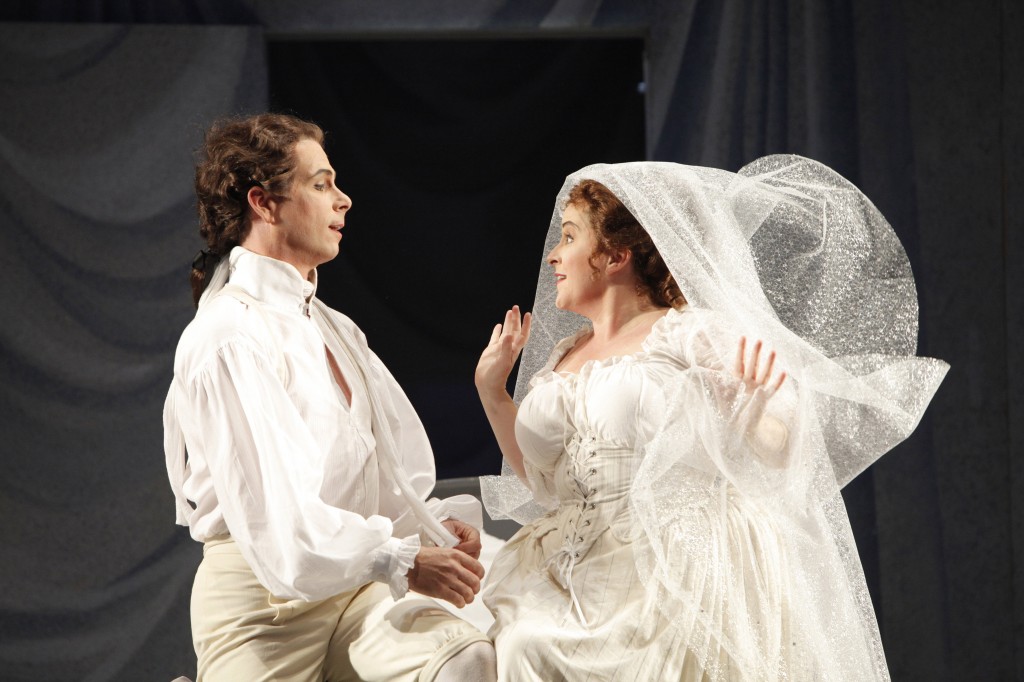 ©Portland Opera/Cory Weaver
©Portland Opera/Cory Weaver
By Bob Hicks
Mr. Scatter is just getting around to letting you know that he and Mrs. Scatter joined the opening-night throng on Friday for Wolfgang Amadeus Mozart and Lorenzo Da Ponte‘s opera buffa The Marriage of Figaro, based on Pierre Beaumarchais‘ stage comedy of the same name, at Portland Opera. (It also happened to be opening night of PO’s 2011-12 season, which might have accounted for the slightly larger than usual sprinkling of formal dress amid the usual Oregon mackinaws and mucklucks. Mr. Scatter marked the occasion by changing out of his jeans into semi-creased khakis and slinging on a quilt-lined country walking sportjacket, much to the dazzlement of his eternal bride, whose comments on his sartorial attentiveness ordinarily run along the lines of “There’s a hole in your T-shirt.”)
Please forgive Mr. S’s sloth in filing his report. Could be he dilly-dallied because he didn’t really have much to add to the excellent summations of the mainline critics, James McQuillen in The Oregonian and James Bash at Oregon Music News. Mr. S agrees with McQuillen that this is very much a traditional production. It reminds him of the hoary theater joke: “Did you hear about the radical new Hamlet? They did it in Elizabethan dress.” He also concedes that the original satire (Beamarchais’ 1778 play was banned for several years for its biting depiction of the ruling classes, not reaching the stage until 1784, just two years before the opera) has lost a few of its teeth in the ensuing centuries. Still, if the guffaws of the twentysomethings sitting behind the Scatters are any indication, the comedy remains fresh and ribald and (Mr. S hesitates to use this purportedly naughty word for fear of being drummed out of the League of Tough Guy Arts Observers) entertaining. While there can be and have been highly successful radical takes on The Marriage of Figaro, when what you’re dealing with happens to be a work of comic genius, traditional isn’t such a bad thing to be. This is known in some circles as If It Ain’t Broke, Don’t Fix It.
What particularly struck Mr. Scatter this time around was the splendid balances of Mozart’s music for this opera. It’s not the almost mathematical balances of Bach, which have their own charms, but a more dynamic balance — a matching of voices and vocal weight that encourages (indeed, practically demands) an ensemble approach to the singing. It’s not that there aren’t some stunning solo moments: Figaro has some arias that can hold an auditorium in suspended time. But in this opera stunning vocal gymnastics are less important than the interweaving of voices and characters, and that could be the key to why Portland Opera’s production is so pleasing: everything works together. Three things mark the singing in this Figaro: precision in tone and attack (everyone’s emphatically in tune); an evenness of projection and tonality; and vocal warmth.
Jennifer Aylmer’s Susanna (the bride) and Pamela Armstrong’s Countess Almaviva are well enough matched physically to make the bed-switch aspects of the plot plausible, and their voices are complementary, Aylmer’s a little brighter, Armstrong’s a little more colored. Jennifer Holloway is so lightly adept as Cherubino that she seems to put on her pants role both legs at a time. David Pittsinger has the sort of matinee-idol carriage that brings Count Almaviva’s little corruptions of conceit to life. And Daniel Mobbs, as Figaro, deftly balances the odd requirement that his character be the center of the comedy and also step aside so the women can slip into the drivers’ seat. Kudos to stage director Stephen Lawless, who keeps all these balances sharp and lively, and to conductor Ari Pelto, who keeps the orchestra precise and urgent while providing a little showmanship of his own as he bobs and jabs from the podium. His approach might be a little showy. But after all, isn’t this a show?
*
PHOTO: Daniel Mobbs as Figaro and Jennifer Aylmer as Susanna. ©Portland Opera/Cory Weaver.